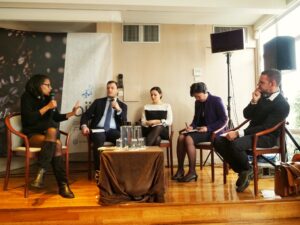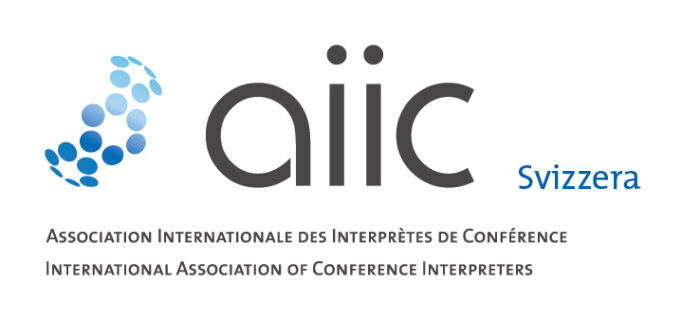AIIC PRIMS MEETING IN LYON, FRANCE January 25th, 2020 – 09:30 – 12:30

Roundtable discussion:
Confidentiality and professional ethics in the age of social media.
Summary by Melanie Klemm (AIIC-Suisse) edited by Gillian Misener (AIIC-Canada)
Saturday started with a roundtable discussion moderated by Ms. Audrey Pulvar, journalist, TV and radio host. Prior to the discussion, each of the speakers took the floor for a brief presentation.
Marco Scalvini, Lecturer in Media and Communication, Erasmus University Rotterdam
Mr. Scalvini introduced the topic of ethics by briefly touching on theoretical concepts, followed by an interactive session on ethical assessment of specific situations. The interactive Q&A, on the different situations presented, revealed a split audience and illustrated how difficult it is to draw the line between right and wrong. Ethics go beyond personal interest; they create social stability and promote moral values shared by a specific society. Nihilism and the questioning of reality occur when societies are no longer bound by ethical values, and individuals are no longer capable of distinguishing between good and bad decisions.
Mr. Scalvini emphasized that personal and professional ethics should go hand in hand. As individuals and as a professional association, we need to consider the effects of our actions and principles. Confidentiality, for example, is an ethical principle applied to interpreting, journalism, law, medicine and other professions. Nowadays, due to the influence and the expansion of social media, the boundaries that define confidentiality are no longer clear-cut. Is it possible to generate social media content for self-marketing without breaching confidentiality? Why should interpreters market their services on social media? Mr. Scalvini prompted the audience to think about why clients hire interpreters: is it because of their marketing skills, or because of their interpreting skills and professional ethics?
Mr. Scalvini concluded by pointing out that professional ethics must be shared and, regardless of the profession, ethical professionals have a duty to provide the best service in their area of expertise.
Ms. Ghiliana Mikhailova, Director of the Center for International Protocol, Russian Presidential Academy of National Economy and Public Administration.
The word respect permeated Ms. Mikhailova’s presentation. Respect lays the foundation for good and positive relationships, in both professional and personal settings. Interpreters who work in diplomatic settings must be aware of protocol rules and abide by them. Interpreters play a key role in diplomatic communication and must understand that in diplomatic settings they are part of a team that strives to achieve one common goal: to show respect. Ms. Mikhailova advised interpreters not to get involved in politics, because they might be asked to interpret for different political parties, and political involvement might result in a conflict of interest.
Ms. Mikhailova pointed out that despite the positive aspects of modern technology, there is also a negative aspect that few take into consideration. Mobile phones, for example, allow people to gain access to situations or places that would have been completely off-limits 10 years ago, so individuals must know how and when to use technology, and understand the consequences thereof. For example, posting behind-the-scenes images of a political meeting on social media could have negative consequences.
Ms. Florence Agostino-Etchetto, CEO of Lyonbiopôle
Ms. Agostino-Etchetto emphasized the importance of confidentiality. Most communication in the pharmaceutical industry takes place in English, and interpreters are only hired for meetings when one of the participants is not fluent in English. During such meetings, interpreters could potentially learn about corporate decisions that have ethical implications, for example, by affecting drug development or public health, which in turn could have a global impact. The pharmaceutical industry constantly faces ethical decision making, so the R&D sector must strike a balance between finding answers to individual needs and global or interests.
Mr. Uroš Peterc, President of AIIC
Mr. Peterc highlighted that interpreters are experts in multilingual communication, and that despite the individualistic nature of the interpreting profession, 3.000 AIIC members worldwide follow the AIIC Code of Ethics. Mr. Peterc pointed out that certain decisions are difficult to make and that when in doubt, people should remember: “Treat others as you would like them to treat you”.
Governments, international organizations, companies and other clients hire interpreters because we are experts in multilingual communication and abide by high professional standards, including confidentiality. Yet, nowadays, some have a different perception of confidentiality and argue that social media posts are tantamount to an informal letter of recommendation. Is that indeed the case? Would the client necessarily agree? In the age of social media, the lines between professional and personal interests are increasingly blurred, and thus interpreters should not allow their personal interests to interfere with their professional lives. Interpreters should always ask themselves: Why have I been hired? The answer to that question brings us back to the AIIC President’s message: we are experts in multilingual communication and abide by high professional standards.
After the presentations, members of the roundtable discussed different aspects of professional ethics in the age of social media, and also answered questions from the audience.
Note: we would like to thank the volunteer interpreters for ensuring seamless multilingual communication during this conference. Thanks go to Julia Poger, Joshua Goldsmith, Benjamin Barclay (English booth), Odile Montpetit, Clemence Amat, Louise Brodie (French booth), and Yuliya Tsaplina, Violetta Tomalcheva, and Anton Klevansky (Russian booth).
Don’t miss our article on pre-PRIMS activities such as workshops, etc.
You will find more interesting information on other PRIMS sessions here.
